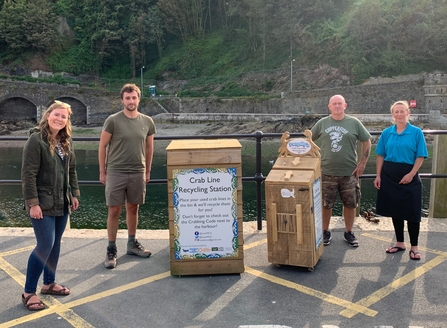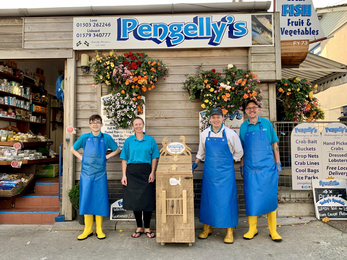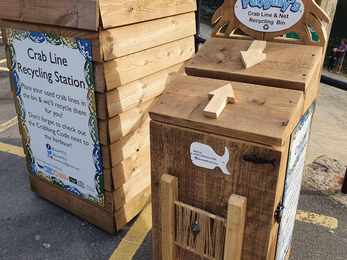In a collaborative effort with local businesses, Looe Marine Conservation Group has masterminded a novel sponsorship solution, deploying recycling stations along the harbourside to provide users with a place to deposit crabbing equipment after use. The stations, made from handcrafted recycled wood, will be regularly emptied by volunteers who will sort through the contents and decide the fate of the lines. Those that can be reused will be offered to the public, and those that can’t will be recycled where possible. Some will go to be recycled into ocean kayaks.
UK's first crab line recycling scheme to reduce plastic pollution launched in Looe

The team behind the crab line recycling station launch and sponsorship scheme in Looe, Cornwall. L-R: Amelia Bridges (Chairperson of Looe Marine Conservation Group and marine biologist), Sam Gill (manager of Banjo Beach Shop), Pete Spencer (carpenter and owner of Josey Whales) and Hayley Phillips (fishmonger and owner of Pengelley’s Fishmongers).
Amelia Bridges, chairperson of Looe Marine Conservation Group (MCG) and coordinator of the scheme, says:
“We’re so happy to be installing the first prototypes of these handcrafted stations and a sponsorship opportunity for businesses in the town to get involved. For years, we’ve racked our brains to identify a solution to this growing problem and hope this scheme, alongside our Crabbing Code of Conduct launched last year, goes some way towards that. Discarded crab lines and nets pose very real threats to marine wildlife, particularly in terms of entanglement, and pose a problem for our inshore fishing fleet by fouling propellers so anything we can do to stop that is really worthwhile.”
Teaming up with Looe MCG to make the stations is carpenter Pete Spencer from Josey Whales, Looe. Pete says:
“I’m really excited to be working with Looe MCG and local businesses to handmake these stations. We’ve tried to ensure they are as environmentally friendly as possible which is why we’ve chosen to make them from reclaimed scaffold board. It also gives the stations a really nice rustic look that fits in well in an old Cornish fishing town.”
To help fund the scheme, businesses will be able to donate a small fee to sponsor a recycling station of their own. Two businesses are launching the first of the stations. Hayley Phillips, owner of Pengelly’s Fishmongers, says:
“We love to see crabbing taking place because it’s a traditional Cornish past time. As one of the many vendors of crabbing equipment, we also want to encourage the correct disposal of the products when they are no longer required which is why getting involved in this scheme was the perfect fit.”
The recycling scheme has been developed alongside other actions to reduce plastic crabbing waste. Sam Gill, manager of the Banjo Pier Shop and guardian of the second recycling station identified that retail shops in Looe buy roughly 10% of all crab lines sold in the UK. He explained:
“For a while we’ve been working with locals and our suppliers to make crabbing more sustainable – creating and stocking biodegradable, all-natural crab lines for an affordable price of £1.99 – the same as a plastic one – and promoting proper disposal through signs. With this next step we feel pleased that we can help people enjoy Looe’s most popular pastime in the most environmentally-positive way possible.”
Looe Marine Conservation Group will be liaising with local businesses in the coming months to have more bins in place by next season. Their aim is to achieve a self-financing scheme that supports the continuation of this popular activity, involves our local business community and delivers a circular economy solution by reclaiming wooden materials and recycling plastic.


